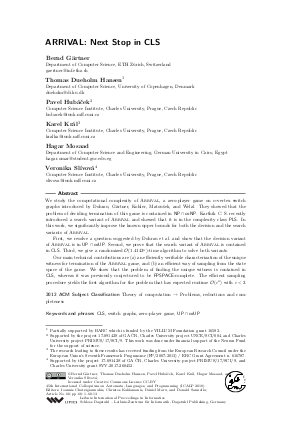ARRIVAL: Next Stop in CLS
Authors Bernd Gärtner, Thomas Dueholm Hansen, Pavel Hubácek, Karel Král, Hagar Mosaad, Veronika Slívová
-
Part of:
Volume:
45th International Colloquium on Automata, Languages, and Programming (ICALP 2018)
Part of: Series: Leibniz International Proceedings in Informatics (LIPIcs)
Part of: Conference: International Colloquium on Automata, Languages, and Programming (ICALP) - License:
 Creative Commons Attribution 3.0 Unported license
Creative Commons Attribution 3.0 Unported license
- Publication Date: 2018-07-04
File

PDF
LIPIcs.ICALP.2018.60.pdf
- Filesize: 0.57 MB
- 13 pages
Document Identifiers
Related Versions
Subject Classification
ACM Subject Classification
- Theory of computation → Problems, reductions and completeness
Keywords
- CLS
- switch graphs
- zero-player game
- UP n coUP
Metrics
- Access Statistics
-
Total Accesses (updated on a weekly basis)
0Document
0Metadata
Abstract
We study the computational complexity of Arrival, a zero-player game on n-vertex switch graphs introduced by Dohrau, Gärtner, Kohler, Matousek, and Welzl. They showed that the problem of deciding termination of this game is contained in NP n coNP. Karthik C. S. recently introduced a search variant of Arrival and showed that it is in the complexity class PLS. In this work, we significantly improve the known upper bounds for both the decision and the search variants of Arrival. First, we resolve a question suggested by Dohrau et al. and show that the decision variant of Arrival is in UP n coUP. Second, we prove that the search variant of Arrival is contained in CLS. Third, we give a randomized O(1.4143^n)-time algorithm to solve both variants. Our main technical contributions are (a) an efficiently verifiable characterization of the unique witness for termination of the Arrival game, and (b) an efficient way of sampling from the state space of the game. We show that the problem of finding the unique witness is contained in CLS, whereas it was previously conjectured to be FPSPACE-complete. The efficient sampling procedure yields the first algorithm for the problem that has expected runtime O(c^n) with c<2.
Cite As Get BibTex
Bernd Gärtner, Thomas Dueholm Hansen, Pavel Hubácek, Karel Král, Hagar Mosaad, and Veronika Slívová. ARRIVAL: Next Stop in CLS. In 45th International Colloquium on Automata, Languages, and Programming (ICALP 2018). Leibniz International Proceedings in Informatics (LIPIcs), Volume 107, pp. 60:1-60:13, Schloss Dagstuhl – Leibniz-Zentrum für Informatik (2018)
https://doi.org/10.4230/LIPIcs.ICALP.2018.60
BibTex
@InProceedings{gartner_et_al:LIPIcs.ICALP.2018.60,
author = {G\"{a}rtner, Bernd and Hansen, Thomas Dueholm and Hub\'{a}cek, Pavel and Kr\'{a}l, Karel and Mosaad, Hagar and Sl{\'\i}vov\'{a}, Veronika},
title = {{ARRIVAL: Next Stop in CLS}},
booktitle = {45th International Colloquium on Automata, Languages, and Programming (ICALP 2018)},
pages = {60:1--60:13},
series = {Leibniz International Proceedings in Informatics (LIPIcs)},
ISBN = {978-3-95977-076-7},
ISSN = {1868-8969},
year = {2018},
volume = {107},
editor = {Chatzigiannakis, Ioannis and Kaklamanis, Christos and Marx, D\'{a}niel and Sannella, Donald},
publisher = {Schloss Dagstuhl -- Leibniz-Zentrum f{\"u}r Informatik},
address = {Dagstuhl, Germany},
URL = {https://drops.dagstuhl.de/entities/document/10.4230/LIPIcs.ICALP.2018.60},
URN = {urn:nbn:de:0030-drops-90641},
doi = {10.4230/LIPIcs.ICALP.2018.60},
annote = {Keywords: CLS, switch graphs, zero-player game, UP n coUP}
}
Author Details
Funding
- Hansen, Thomas Dueholm: Partially supported by BARC which is funded by the VILLUM Foundation grant 16582.
- Hubácek, Pavel: Supported by the project 17-09142S of GA ČR, Charles University project UNCE/SCI/004, and Charles University project PRIMUS/17/SCI/9. This work was done under financial support of the Neuron Fund for the support of science.
- Král, Karel: The research leading to these results has received funding from the European Research Council under the European Union’s Seventh Framework Programme (FP/2007-2013) / ERC Grant Agreement n. 616787.
- Slívová, Veronika: Supported by the project 17-09142S of GA ČR, Charles University project PRIMUS/17/SCI/9, and Charles University grant SVV-2017-260452.
References
-
David Aldous. Minimization algorithms and random walk on the d-cube. The Annals of Probability, 11(2):403-413, 1983.

-
Josh Buresh-Oppenheim and Tsuyoshi Morioka. Relativized NP search problems and propositional proof systems. In 19th Annual IEEE Conference on Computational Complexity (CCC 2004), 21-24 June 2004, Amherst, MA, USA, pages 54-67, 2004.

-
Anne Condon. The complexity of stochastic games. Information and Computation, 96(2):203-224, 1992.

-
Constantinos Daskalakis and Christos H. Papadimitriou. Continuous local search. In Proceedings of the Twenty-Second Annual ACM-SIAM Symposium on Discrete Algorithms, SODA 2011, San Francisco, California, USA, January 23-25, 2011, pages 790-804, 2011.

-
Jérôme Dohrau, Bernd Gärtner, Manuel Kohler, Jiří Matoušek, and Emo Welzl. ARRIVAL: A zero-player graph game in NP∩coNP. In Martin Loebl, Jaroslav Nešetřil, and Robin Thomas, editors, A Journey Through Discrete Mathematics: A Tribute to Jiří Matoušek, pages 367-374. Springer International Publishing, 2017.

- John Fearnley, Martin Gairing, Matthias Mnich, and Rahul Savani. Reachability switching games. CoRR, abs/1709.08991, 2017. URL: http://arxiv.org/abs/1709.08991.
- John Fearnley, Spencer Gordon, Ruta Mehta, and Rahul Savani. CLS: new problems and completeness. CoRR, abs/1702.06017, 2017. URL: http://arxiv.org/abs/1702.06017.
- Bernd Gärtner, Thomas Dueholm Hansen, Pavel Hubáček, Karel Král, Hagar Mosaad, and Veronika Slívová. ARRIVAL: next stop in CLS. CoRR, abs/1802.07702, 2018. URL: http://arxiv.org/abs/1802.07702.
-
Pavel Hubáček and Eylon Yogev. Hardness of continuous local search: Query complexity and cryptographic lower bounds. In Proceedings of the Twenty-Eighth Annual ACM-SIAM Symposium on Discrete Algorithms, SODA 2017, Barcelona, Spain, Hotel Porta Fira, January 16-19, pages 1352-1371, 2017.

-
David S. Johnson, Christos H. Papadimitriou, and Mihalis Yannakakis. How easy is local search? J. Comput. Syst. Sci., 37(1):79-100, 1988.

-
Bastian Katz, Ignaz Rutter, and Gerhard J. Woeginger. An algorithmic study of switch graphs. Acta Inf., 49(5):295-312, 2012.

- Tsuyoshi Morioka. Classification of search problems and their definability in bounded arithmetic. Electronic Colloquium on Computational Complexity (ECCC), 2001. URL: https://eccc.weizmann.ac.il/eccc-reports/2001/TR01-082/index.html.
-
Christos H. Papadimitriou. On the complexity of the parity argument and other inefficient proofs of existence. J. Comput. Syst. Sci., 48(3):498-532, 1994.

-
Karthik C. S. Did the train reach its destination: The complexity of finding a witness. Inf. Process. Lett., 121:17-21, 2017.

